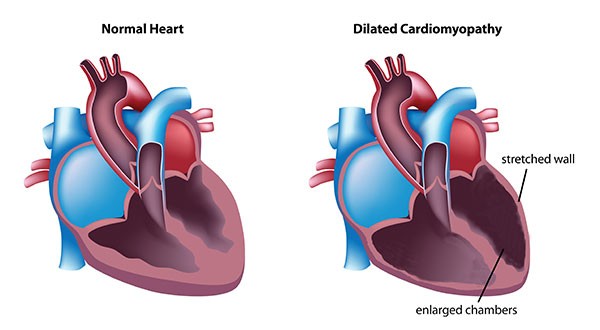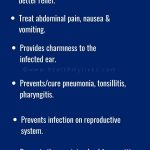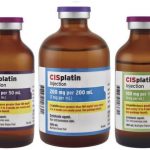
Contents
- 1 Dilated Cardiomyopathy
Dilated Cardiomyopathy
Dilated cardiomyopathy is a heart muscle disease that causes progressive enlargement and weakening of the heart muscles. The heart chambers become dilated, stretching the muscles and reducing the heart’s ability to pump enough blood.
While other conditions like myocardial infarction can also cause dilated cardiomyopathy, many cases are due to genetic abnormalities. Dilated cardiomyopathy can affect individuals within the same family, with varying degrees of severity.
Dilated cardiomyopathy affects 36 out of 100,000 people and causes 10,000 fatalities and 46,000 hospitalizations annually in the United States. However, these figures may not account for all cases as many people are asymptomatic and misdiagnosed.
How do you get dilated cardiomyopathy?
Dilated cardiomyopathy can be inherited or caused by environmental factors such as:
- Viral infections of the heart
- Severe coronary artery disease
- Heart-damaging drugs
- Heart valve abnormalities
- Diabetes
- Thyroid disease
- Alcoholism
Risk factors for dilated cardiomyopathy include:
- Ethnicity: African Americans are at higher risk
- Gender: Men are more affected
- Genetic predisposition: Family history of cardiomyopathy, heart failure, or sudden cardiac arrest increases the risk
- Associated cardiac problems: Risk increases with other disorders like coronary heart disease or a history of heart attack
- Excessive alcohol intake: Can cause left ventricular dilatation
What are the signs of dilated cardiomyopathy?
As a progressive condition, dilated cardiomyopathy may not initially cause noticeable symptoms until the heart’s function worsens. Symptoms can include:
- Dyspnea (shortness of breath)
- Shortness of breath with exertion
- Orthopnea (shortness of breath when lying down)
- Edema (fluid retention in the feet, ankles, legs, or abdomen)
- Chest pain
- Palpitations
- Blood clots
- Lung congestion
- Fatigue
- Decreased exercise capacity
- Weight gain
- Lightheadedness
- Fainting episodes
- Sudden death
QUESTION
How is dilated cardiomyopathy diagnosed?
To confirm a diagnosis of dilated cardiomyopathy, your cardiologist will take a thorough medical history, assess symptoms, and perform a physical exam. Additional tests may include:
- Blood tests: Determine causes and detect potential infections or metabolic issues
- Genetic testing: Ordered if there is a family history of cardiac diseases
- Serum B-type natriuretic peptide (BNP) levels: Can help determine the prognosis
- Urine toxicology: Checks for substance abuse
- Chest X-ray: Reveals cardiomegaly, pulmonary effusions, and venous congestion
- CT scan and MRI: Detect structural and functional abnormalities
- Electrocardiogram: Reveals abnormalities and detects atrial fibrillation
- Echocardiography: Diagnose dilated cardiomyopathy and differentiate from other types
- Coronary angiography: Evaluates coronary architecture and rules out ischemia diseases
- Myocardial biopsy: May be done when storage disorders or infiltrative causes are suspected
What is the treatment for dilated cardiomyopathy?
Treatment focuses on managing symptoms and reducing complications. Continuous monitoring is crucial and treatment options are customized based on symptoms.
Medications
Medications used to treat dilated cardiomyopathy may include:
- Anti-inflammatory agents: Reduce inflammation
- Steroids: Suppress immune responses
- Diuretics: Eliminate excess fluids
- Beta-blockers: Reduce blood pressure
- Angiotensin-converting enzyme inhibitors: Improve blood circulation
- Inotropes: Improve contractility and heart’s output
Some medications used to treat dilated cardiomyopathy have adverse effects, so precautions must be taken:
- Angiotensin-converting enzyme inhibitors may cause episodes of low blood pressure and adverse effects on the kidneys and liver with long overdoses of combination medications.
- Beta-blockers can occasionally produce dizziness and muscular cramping.
- Blood thinning drugs help blood flow but increase the risk of significant blood loss due to accidental injury.
Mechanical heart
If heart function worsens and medicines do not help, ventricular assist devices (mechanical cardiac support methods) may be used. These devices are surgically implanted into the heart to improve blood circulation.
In some cases, the person may be put on an extracorporeal membrane oxygenation (ECMO) machine, which is a heart-lung bypass machine. Mechanical cardiac support carries risks such as serious infections and blood clots.
Heart transplantation
Heart transplantation is the last resort when other treatments fail or there is permanent heart damage. Continuous medical care and immunosuppressants are required to prevent organ rejection. Some individuals may require a second heart transplant.
How serious is dilated cardiomyopathy?
Dilated cardiomyopathy can lead to serious heart problems. While some cases caused by a virus may be cured with medications, cardiomyopathy caused by muscle dystrophy, cancer treatments, or metabolic disorders is usually progressive.
About 33% of people with dilated cardiomyopathy recover, 33% remain the same but with impaired cardiac function, and 33% develop heart failure that may result in death. Heart transplantation is the only effective treatment to improve survival rates.
What should you not do if you have cardiomyopathy?
Dilated cardiomyopathy can be caused by hereditary factors, alcoholism, thyroid disorders, or even diabetes. It is crucial to follow a suitable diet plan and take appropriate medications to treat the condition.
High blood pressure is often associated with dilated cardiomyopathy, so follow a low-sodium diet. Daily salt consumption should not exceed 2000 to 3000 mg per day. Avoid processed and fried foods, as well as foods high in concentrated salt components like pickles, sauce, and ketchup.
By clicking "Submit," I agree to the MedicineNet Terms and Conditions and Privacy Policy. I also agree to receive emails from MedicineNet and understand that I may opt out of MedicineNet subscriptions at any time.
By clicking "Submit," I agree to the MedicineNet Terms and Conditions and Privacy Policy. I also agree to receive emails from MedicineNet and understand that I may opt out of MedicineNet subscriptions at any time.


